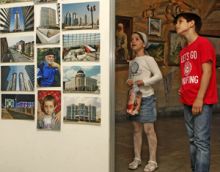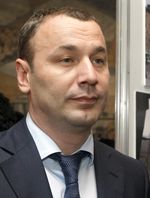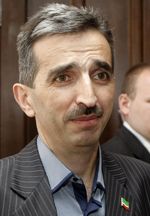In the mind of an average Ukrainian, Chechnya is associated with two things: war and terrorism. This image may have been enriched in the past few years by the ubiquitous picture of “strong friendship” between the republic’s President Ramzan Kadyrov and Vladimir Putin. Whoever can see the slick photos of a rebuilt Grozny, the capital of the Chechen Republic, is often shocked. But this is unlikely to help you have a clearer picture of what is going on in this region. Moreover, very few may be thinking of Chechnya as a country that strives for a dialogue.
Yet it is about the desire to have a dialogue and cooperation that members of the Chechen governmental delegation, which visited Kyiv on May 21 as part of The Days of Chechen Culture in Ukraine, spoke.
In fact, this cultural event was organized in Ukraine for the first time by the civic organization Chechen People’s Diaspora for two purposes: to change the negative image of a Chechen and, what is more, to establish economic relations. As the Chechen Minister of Culture Dikalu Muzakayev said, “we will be strengthening our relations by means of culture.” But the fact that The Days of Chechen Culture were held as part of the Russia-Ukraine interregional cooperation program only confirmed that the economy was also on the agenda. It will be recalled that the program of the two countries’ interregional and cross-border cooperation for 2011-16 was adopted in October 2010 in Gelendzhik.
Those who were invited to attend the official part of the event were representatives of Chechnya’s government (including Idris Usmanov, first deputy speaker of the republic’s parliament; Anzor Muzayev, Minister of Education and Science; and Zaurbek Saidov, Rector of Chechen State University); Mikhail Zurabov, Russia’s Ambassador to Ukraine; and Hanna Herman, chief of the Presidential Administration’s Humanitarian and Sociopolitical Department. The official part was preceded by a roundtable, “Chechnya through the Eyes of Ukrainians,” and accompanied by the photo exhibits “Grozny Yesterday and Today,” “People,” and “The Nature of Northern Caucasus.”
“WE WOULD LOVE TO SHOW EVERYBODY WITH OUR BEHAVIOR THAT WE ARE HUMANE”
According to governmental officials, the Chechen Republic is now the Russian Federation’s most burgeoning region. But, as is known, one cannot successfully develop in isolation. This is why Chechnya is now trying so hard to project a better image in the eyes of others and become easier-to-understand. As Dunai Kurazov, representative of the Zaporizhia branch of the Chechen People’s Diaspora organization, said, “We would love to show everybody with our behavior that we are humane.” Incidentally, the 20th-century Chechen prose writer and poet Magomet Mamakayev also spoke about humaneness: “Throughout the history of the Chechen people, the idea of ‘Chechenness’ has never dominated over that of ‘humaneness.’” But now, after the two past wars and a scathing informational campaign in the Russian media, Chechnya has to prove its tolerance to the others, the right to an ancient culture, and the ability to be a partner.
As far as culture is concerned, I was pleasantly surprised by some points that I heard at the roundtable. Firstly, there was no serfdom at all in Chechnya. Secondly, way back in the 14th century, there was tribal (based on teips and tukkhums) democracy in the country as well as a Chechen code of honor, which comprised the whole range of moral and ethical norms, including the notorious tolerance. And, thirdly, the Chechen poet Shaikhi Arsanukayev translated the works of Taras Shevchenko and Lesia Ukrainka into his native language.
As for partnership, a major obstacle is objectionable information on the republic’s domestic and foreign policy. For example, many do not understand how love for Chechnya can go hand in hand with absolute support for Vladimir Putin. But, as it became clear in the course of the meeting with Chechnya’s representatives, the republic’s leadership has decided to play by imperial rules. To better understand the present-day Chechnya, The Day interviewed Anzor MUZAYEV, Chechnya’s Minister of Education and Science; and Abdi NURADINOV, Doctor of Sciences (Engineering), member of Ukraine’s National Academy of Sciences.
ANZOR MUZAYEV: “WE ARE BANKING ON EDUCATION IN CHECHNYA’S FURTHER DEVELOPMENT”
“For centuries on end, the Chechen people have survived all the ordeals because they managed to retain their native language, dance, and customs. This is a cementing factor of sorts. Looking for something negative in history is not an end in itself for us. What other politicians have done before is a thing of the past,” Anzor MUZAYEV says. “Savoring these negative facts will result in no progress. This is why we are not highlighting negative things – we have closed all the pages and are striving to march forward. We are putting emphasis today on tolerance for any ethnicity and faith.”
Before the two past wars, the Chechen nation was referred to as follower of peaceful Islam. What paved the way to the ideological manipulations that resulted in an outbreak of extremism? And what should we do to avert this, for it is sometimes not enough just to turn a page of history?
“The collapse of the USSR triggered conflicts not only on our territory. There still are a lot of unresolved conflicts. But the centuries-old wisdom of the Chechen and Russian peoples helped change the picture in a matter of a few years. The policy pursued by the federal center was not easy to understand for many in the world, but the result of this policy is that Chechnya is now one of the Russian Federation’s most burgeoning regions. Today, we have switched from restoring the social sphere to restoring the industry, education, etc. We are implementing a host of programs which will give us such a strong impetus in a few years’ time that we will undoubtedly be among the best in Russia.”
What is your vision of this development?
“While a few years ago the president emphasized restoring the social sphere, now we are changing the priorities and focusing on education. A lot of programs have been launched. Among them is target-oriented admission to Russian higher education institutions as well as to three in our republic, which have been ideally restored. We will see very soon the new campus of Chechen State University. Also in progress is the Chechen President’s Program, whereby 240 Chechen students are receiving education in Germany and Britain. This program is aimed at training specialists in physics, chemistry, biology, and medicine. Our students are to do the complete cycle of education and be awarded a doctorate at British and German universities and then, under the contract, they will have to teach at Chechen schools for three years. The industry is also high on the agenda, but it cannot be restored unless we have skilled specialists. All these things are interconnected. Speaking of the industry, among the first facilities to be re-commissioned are an oil refinery and a cement works that used to provide the entire North Caucasus with its products. It is impossible to develop agriculture unless there is a processing industry. Canneries are also being restored all over the republic. These are the three top priorities.”
ABDI NURADINOV: “IF PUTIN IS CONSIDERING THE POSSIBILITY OF ONE MORE PRESIDATNTIAL TERM, HE WILL BE ENDLESSLY GIVING CARTE BLANCHE TO KADYROV”
“Before the wars, there were three oil refineries, two chemical plants, not to mention oil machine building, farming, the infrastructure, etc., in Grozny alone. There is not a single region with such an industrial potential either in Russia or in Ukraine. In my view, both Chechen wars were caused by geopolitical as well as commercial factors. In an attempt to solve certain geopolitical problems, [the vested interests] would remove their potential rivals in oil extraction and refining,” Abdi NURADINOV says. “Chechnya, with an area of one fourth of Kyiv oblast, used to produce an annual 22 million tons of oil, whereas the entire Ukraine consumes about 40 million tons a year. This huge potential was destroyed in one fell swoop, which left the people in such a desperate plight. But let us hope that a time will come when all this will revive.”
The Chechen leaders are saying their country is being rebuilt. But has the nation managed to preserve the spiritual and cultural potential it had before the war? What is the situation with historical memory and how strong is the impact of the empire?
“As for the cultural potential, we cannot, of course, claim that it has been preserved at least owing to purely physical losses. But there are all the conditions today to be able to achieve the high prewar level. I can say as an outside observer that so much attention is being paid now to culture and literature that this defies comparison to the good old times. I do not think, either, that there is any imperial interference. The problems of Chechen culture are the problems of small-size peoples.”
And if we look on Chechnya as a factor in Russian development…
“This may sound a bit excessive, but, on the other hand, this may be true in a way because all the political experiments of an all-Russian scale were first tried out in Chechnya. We can remember Dzhokhar Dudayev dissolving our regional parliament. Following this, Boris Yeltsin dissolved Russia’s highest legislature in October 1993. All the Russian politicians and bureaucrats of non-Chechen origin, who held top offices in Chechnya, used this as a steppingstone for their political promotion. As a rule, they would find a cushy job in the Russian capital. And, in general, if Russia and the Chechens are wise enough, the 1990s events will be a good lesson for the future history because the Chechen leadership also shares the blame, to some extent, for the two past tragedies.”
Kadyrov and Putin are publicly demonstrating that their relations are almost ideal. Is this “political love” going to last for a long time?
“I think good relations between Putin and Kadyrov can be explained by the fact that the latter has really managed to establish strict order in Chechnya, which the Russian army and security services failed to do over 15 years. You know very well that if you don’t put your house in order by yourself, no other good uncle will do so. So if Putin is considering the possibility of one more presidential term, he will be endlessly giving carte blanche to Kadyrov as long as he needs this. And, in general, we must give Kadyrov his due: everything is not ideal, but he has put the house in order.”
I have never been to Chechnya, but whenever I see photos of the rebuilt Grozny, I am embarrassed by the posters of Kadyrov the younger and his father on almost every building or school. An absolutely Soviet legacy. If the system is based on the clout of one person only…
“…it can decline and fall. We should not jump to one-sided conclusions. For Putin, a former state security officer, knows what he wants. And the fact that portraits of the leaders are hanging in right and wrong places in Chechnya, as if it were the Soviet era now, is an excess of the bureaucrats who are trying to win the leader’s love and keep themselves intact in their offices. There have never been princes in Chechen history, so it is, by all accounts, the initiative of bureaucrats.”
Is classical democracy possible in Chechnya?
“It is a relative concept. In Chechnya, one goes through a tough process of upbringing: they must first learn to obey their parents and then their bosses. But classical European democracy is impossible not only in Chechnya, but also, as it seems to me, in Russia and Ukraine.”
What should be the optimal path of Chechnya’s development, which would help the Chechen nation to survive and preserve its true identity?
“In plain language, one must learn not to kick against the pricks. Russia has been pursuing an imperial policy from times immemorial. It does and will interfere into the affairs of geopolitically stronger states, not to mention small-size nations. So I think we must take a more judicious attitude to the center, with due account of our geographical position. Independence is an illusion and a utopia. In principle, nobody wanted Chechnya to break away from Russia in the 1990s. This was another instance of squandering the resources. Chechnya has good prospects because there still are some undiscovered deposits of hydrocarbon resources. The near future will show whether the republic’s leadership will manage to tap this potential. If administrative and industrial leaders are to be selected on a professional basis, this will, I think, produce a good result.”
Does the existing system, created by Kadyrov, allow effectively ruling the country and selecting the personnel on the basis of professionalism?
“If professionals are appointed to key offices within the framework of a rigid chain of command, this will produce the result for some time.”









